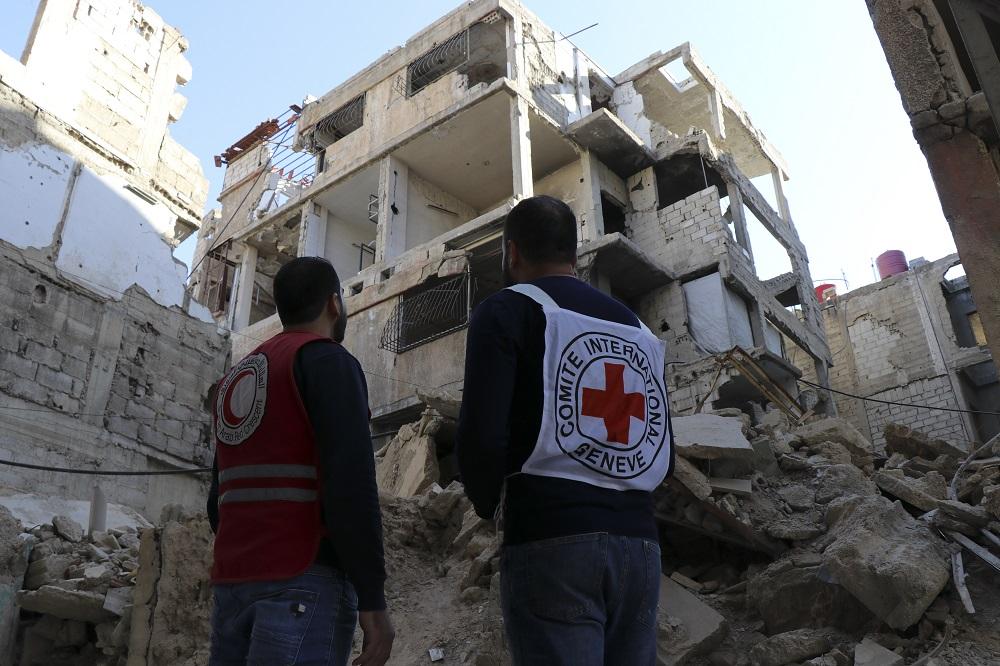
With conflicts in so many parts of the Muslim world, the Islamic law of war is indispensable for the protection of civilians. But is it compatible with international humanitarian law?
Armed conflict brings untold human suffering, and no one understands its impact as do those caught in the middle of it. Ask a parent, a child, a spouse or a sibling about their dead, missing, detained or abducted loved ones and you will appreciate only a tiny part of their pain.
An Egyptian proverb tells us that: ‘The one whose hands are in blood is not as the one whose hands are in water.’ In other words, the amount of pain and suffering of a person affected by a calamity cannot be felt or sometimes even understood by those not personally affected by it. Trying to walk all possible roads to save lives and alleviate the suffering caused by armed conflict or natural disasters is vital if we are to remain truly human, let alone humanitarian.
After almost two decades in academia, I’m proud to be part of a humanitarian organisation that has been walking this road for a long time. During armed conflict, it’s not only adversaries that fight. Our humanity also fights against our own barbarism. We must fight for humanity with all available means—legal frameworks, formal and informal norms, and local cultures and traditions. We also need to employ all possible traditional and innovative venues and tools such as education, training, workshops, meetings and modern technology. If we don’t, human suffering will increase and our barbarism will defeat us.
Right now, two-thirds of the operations and budget of the International Committee of the Red Cross are focused in Muslim contexts. It’s therefore unrealistic to expect the international humanitarian law and principles that underpin our work to be respected if we ignore the role Islamic law plays in influencing the behaviour of Islamic non-state armed groups or state armed forces.
Apart from the fact that humanitarian law isn’t adequately taught in legal and non-legal education, it’s still often viewed as a Western concept or a foreign product. But one of the inherent dangers in the view that it’s a Western product is the myth that its principles are foreign, unknown or in contradiction to other, non-Western civilisations and cultures. This is a real threat to the goal of making humanitarian law universal. For it to be truly universal, all cultures must relate to its principles. A sense of global belonging to its noble, yet pragmatic, objectives must not be discouraged.
Localising the core principles at the heart of international humanitarian law is the doorway to making it universal, which will help strengthen respect for it.
Around the world, the ICRC is working to show similar traditional norms that regulate the use of force. It assigned a group of law students from the University of the South Pacific to research traditional warfare practices in the Pacific. Their research, which was published in 2009, established that prior to European contact there were a number of practices during armed conflict in the Pacific that imposed clear limits on warfare.
The ICRC also found similar norms in the local customs of Indonesia and Somalia. An ICRC delegation in Jakarta is developing a program called ‘Principles of Humanity’ where 10 principles in international law will be complemented by reference to relevant Indonesian customs and norms in Islam, Buddhism, Hinduism and Christianity. But in working to make humanitarian principles universal, we need to educate ourselves and inform others about such values that have long existed locally.
As early as 624 AD, Islamic legal sources and authorities started to develop rules intended to regulate the use of force by Muslims and to alleviate the suffering of people affected by armed conflict.
Rules of war that 7th- and 8th-century Muslim jurists developed address some of the challenges and violations facing humanitarian law in contemporary armed conflict. But more importantly, it is very rewarding to see unanimity among Islamic law professors and Islamic non-state armed groups in Indonesia, the Philippines, Nigeria, Niger, Iran, Amman, Egypt, Bosnia and Herzegovina and other parts of the world on the overall compatibility of international humanitarian law and Islamic law.
Humanitarian law and Islamic law agree on the protection of civilians and their property and infrastructure in war, the protection of humanitarian organisations, the prohibition on indiscriminate means and methods of warfare, humane treatment of prisoners of war, special protection of children and proper and dignified management of the dead, as well as the protection of the environment.
There are many operational challenges facing these humanitarian principles in contemporary armed conflicts in the Muslim world. Addressing these challenges in a way that shows how humanitarian principles are shared across cultures, legal schools, war and history is necessary to sustain life and alleviate suffering. It’s a practical and pragmatic approach that we have adopted to preserve even a bare minimum of humanity in armed conflict. It is an approach that seeks to safeguard not just life, but also human dignity.